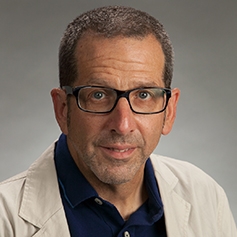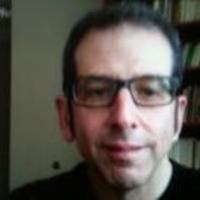Posted on June 11, 2017 at 7:19 pm
My work on “Night” is featured in a talk given by Jewish Professor Alan Astro at St. Francis College in 2014
By Carolyn Yeager
I happened upon this video and recognized my own text of Yiddish-to-French-to-English translation being used by this professor at a Catholic university in San Antonio TX. Though a native of Brooklyn, Alan Astro says he has been at Trinity University for over 25 years. His field is modern languages and literatures; one of the subjects he teaches is Yiddish culture.
His lecture, titled “Christianity and the Holocaust in Elie Wiesel’s Night” was filmed by St. Francis College and at the 6min59sec mark, he shows text from my very important 2012 article “Night #1 and Night #2—What Changes were Made and Why, Part One.” So you never know who is reading this site – a lot of people and all people who have a professional interest in Elie Wiesel.
At 6:59, Astro shows text translated by Kladderadatsch for this web site, which he calls “Where’s the tatoo?” (sic). He says that even though Yiddish was not known very well even in the Jewish world … “Holocaust deniers somehow get their hands on the Yiddish and manage to get it translated. Here is one holocaust denier or minimizer on the web who makes a whole big deal about the fact that in the Yiddish and French and English original translations Wiesel “is not quite 15” when he is arrested and sent to Auschwitz, whereas he is 15 in the newest edition and this is considered to be something that somehow questions the veracity of the whole historical knowledge of the Holocaust. But that’s another issue all together. But it does show you that things can very often have strange consequences.” (He goes quickly to something else at 8:10. So Astro has my text on the screen for one minute, 11 seconds, enough time to read it all.
This is the segment he used:
3. Not yet fifteen … or fifteen?
UdV Page 63 : Yingl, vi alt bistu? fregt mir a heftling. Zeyn pnym iz geven in der fintster, ober zeyn kol iz geven a mids, a varems. Nokh nisht keyn 15 yor, hob ikh geentfert.
“Kid, how old are you?” a prisoner asked me. His face was in darkness, but his voice was tired and warm. “Not yet 15 years,” I answered.
LN Page 54: Hé, le gosse, quel âge as-tu? C’était un détenu qui m’interrogeait. Je ne voyais pas son visage, mais sa voix était lasse et chaude. “Pas encore quinze ans.” / Not yet 15 years.
SR Page 39: “Here, kid, how old are you?” It was one of the prisoners who asked me this. I could not see his face, but his voice was tense and weary. “I’m not quite fifteen yet.”
MW Page 30: “Hey, kid, how old are you?” The man interrogating me was an inmate. I could not see his face, but his voice was weary and warm. “Fifteen”
This very important passage was discussed above. I think the reader would agree that “not yet 15″ can mean even farther from the age of 15 than “not quite fifteen.” What is clear is that Marion Wiesel has changed the author’s original words to fit them to her husband’s age in Spring 1944.
Astro dismisses this important observation with the misrepresentation (in boldface above) that the example is intended to negate the entire holocaust story. No, it isn’t; obviously it questions the veracity of Elie Wiesel’s truthfulness in “Night” since this scene took place in April or May, and the real Wiesel’s 16th birthday was coming up on September 28, 1944. Thus Wiesel was not 14 in Spring ’44, but had already been 15 for at least 7 months. Astro is not interested in telling that to his audience or pursuing it himself. He is a professor of languages and literature, but not an expert on Elie Wiesel or the Holocaust. Far, far from it.
At 19:33, hear him pronounce Wiesel’s name as weasel (as I say it) and then quickly correct himself to the affectation Wie-zell that he used throughout the talk. This indicates that ‘weasel’ is his default way of pronouncing the name, or the way he first learned it.
At right is another photo of Professor Astro I found online that gives what might be a truer look at the man.
Categories Featured | Tags: Elie Wiesel, Naomi Siedman, Night, Un di Velt Hot Gesvign
Leave a Reply
By submitting a comment here you grant Elie Wiesel Cons the World a perpetual license to reproduce your words and name/web site in attribution. Inappropriate or irrelevant comments will be removed at an admin's discretion.




8 Comments to My work on “Night” is featured in a talk given by Jewish Professor Alan Astro at St. Francis College in 2014
by Hans
On June 12, 2017 at 5:22 am
Some telling comments here http://www.ratemyprofessors.com/ShowRatings.jsp?tid=66782
by Carolyn
On June 12, 2017 at 8:42 am
Yes, interesting. The video reveals him not to be a good communicator, just as his students say. He kind of mumbles, doesn’t talk loud enough, and so can be hard to understand. If he didn’t have the visuals I wouldn’t have been able to follow him at all.
In the end, he sums up his “argument”, as he calls it, this way: “It’s not the religious part of Wiesel’s book that is Christian, but is rather the aesthetic elements which are necessarily Christian, and if there is a particularly Jewish component it is the Trial of God. In other words, how could God have this happen, but this is very much condensed but happy to ….” he trails off, I think inviting questions from the audience. This is very much a big nothing burger because it was already discussed by Francois Mauriac way back when he wrote the preface for the original La Nuit in 1958. Astro quotes similar talk from other Jewish writers before he comes to his very unoriginal conclusion. I would have liked to have heard the question-answer session, if there was one.
Typical college professor who has stayed in the same safe spot for 25 years. I am completely down on college. It certainly didn’t do me any good except to say, yes, I’m a college graduate … as many of the comments you linked to imply also, as in “Take the course, you won’t learn anything but it’s an easy grade.”
by Carolyn
On June 12, 2017 at 10:05 am
Another comment: Astro does say that Wiesel never mentioned the Yiddish text until his memoir “All Rivers Run to the Sea”, first published in French in 1994. Strange, right? He asks why at 8min 10sec and gives his “possible reasons.” They are totally false reasons. The real reason, that I have written about on a few occasions, is that Elie didn’t want that Yiddish version to become publicly known – it brought up too much for him to explain.
The reason Wiesel was forced to acknowledge the Yiddish book was because Nicholas Grüner had discovered it around 1988 and accused Elie Wiesel of stealing it from it’s true author, Lazar Wiesel. This has all been well-covered by me on this web site. The reason I bring it up is to show how this ‘professor’ covers for Elie, just as the entire establishment does, and lies or omits in the name of academic scholarship. He certainly knows about Grüner, but never once mentions him as a reason for the “unearthing” of the Yiddish book.
by fred
On July 31, 2017 at 5:54 am
All this is bla bla bla.
It would be more interesting to talk about the German translation. There, the concept “pits of fire” are changed to “gas chambers”. Isn’t this fact more important than any other curiosity related to the translations?
And… does the professor know this?
Of course he does
by Carolyn
On July 31, 2017 at 11:25 am
fred – It’s news … about me, and it’s not the only thing on this site, just the last one.
Christine Miller, a native of Germany, mentioned the German translation of “Night” in an article I published here last year. She wrote: “In the English translation there are no gas chambers.” And quoted from it: “When he (Bela Katz) heard of our arrival, he managed to get word to us that, having been chosen for his strength, he himself put his father’s body into the crematory oven.”
The same sentence in the German translation: “Als er von unserer Ankunft erfuhr, liess er uns sagen, dass er wegen seiner Koeperkraft dem Sonderkommando zugeteilt und dadurch gezwungen worden sei, seinen eigenen Vater in die Gaskammer zu schieben.”
Translated: “When he heard of our arrival, he told us that he had been made a special commando because of his strength and had been forced to push his own father into the gas chamber.”
Miller adds: “In the German translation “Nacht”, all the crematory ovens of “Night” are turned into gas chambers. Western man has been made irrational. That was a necessity, otherwise he could not have been made to believe in the absurdities of the Holocaust lore.”
What we take from this: Wiesel wrote “Night” from 1954 to 1958, before the idea of gas chambers was well-known, and when Auschwitz was still inaccessible behind the Iron Curtain. Not having actually been interned there, he didn’t know first-hand about the camp, thus he made many mistakes which his “advisors” later urged him to try to “fix.” Being comfortable with lies and fancies, he put it off until his wife took over and did it for him. Even so, it was not possible to really “fix” it.
Thanks for your comment.
by boes_adipoes
On August 23, 2017 at 1:16 am
The funny thing is, Wiesel is the german translation of weasel, so the name is pronounced correctly. In addition to this in both languages it has the same meaning projected on humans. Never trust a weasel.
by Nicholas Ennos
On September 13, 2017 at 11:36 am
There does not seem to be much evidence that Wiesel actually wrote “Night”. All his later literary efforts were far inferior. It seems that he was more the front man, a man who spoke English with a strong Eastern European accent that would be accepted by foreigners (apart from Hungarians) as a Hungarian accent, even though it was in fact a Serbian accent from his native Yugoslavia. The actual writing was done by Francois Mauriac, a very famous French Catholic writer who incorporated a lot of Catholic and Christian elements into the book.
by Carolyn
On September 15, 2017 at 7:42 pm
Nicholas, So you are the person who insists Wiesel was Serbian, based on no evidence, only that you say he sounds like it?
I have written about the issues you bring up here and here, and in a few other places on this web site.